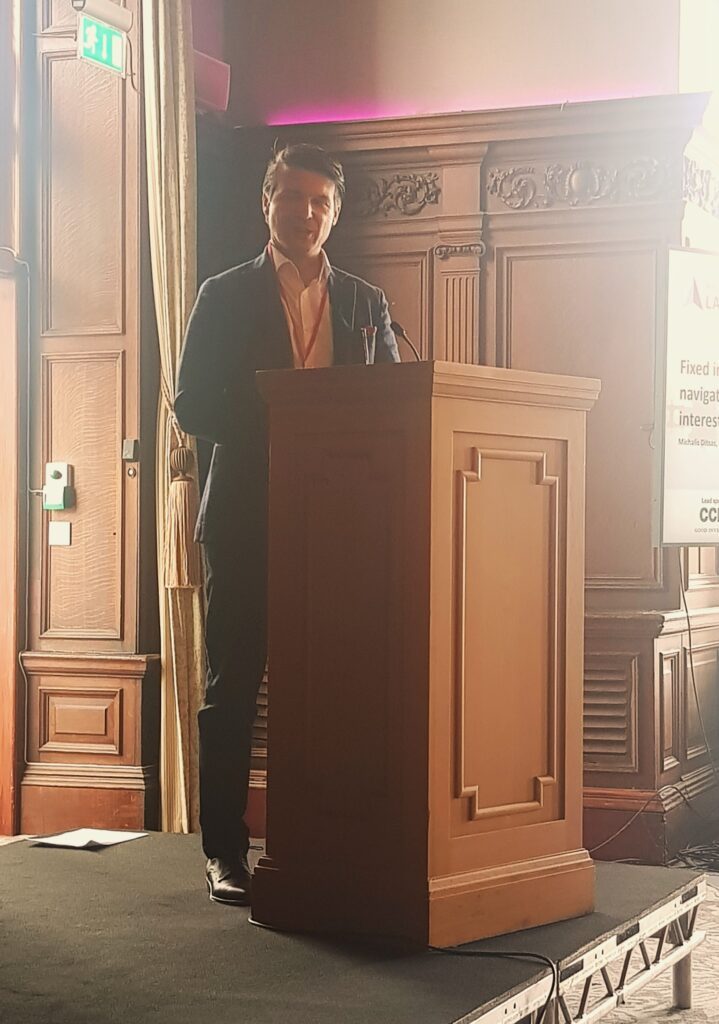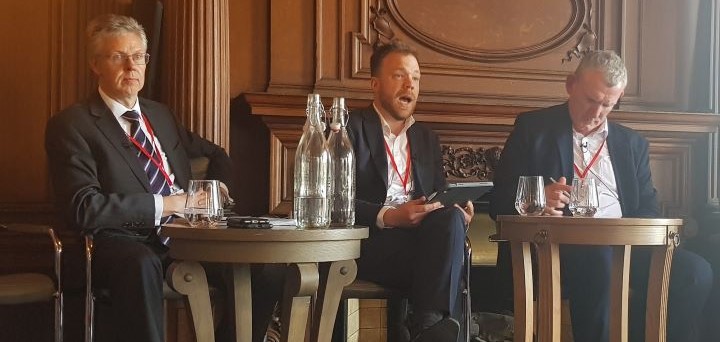Room151’s Local Authority Treasurers Investment Forum North (LATIF North) was held this week in York to great acclaim, bringing together local authority treasurers and section 151 officers to share insights and discuss key topics.
As reported, the event featured a keynote speech from Clive Betts, chair of the Levelling Up, Housing and Communities Committee, who presented possible solutions to local government’s financial pressures. Sidhant Mehta, portfolio manager (cash) at CCLA, and Laura Coroneo, professor of economics at the Department of Economics and Related Studies, University of York, offered an insightful analysis of macro economic trends. You can read more on these sessions here.
Investment opportunities
The LATIF North conference continued with Michalis Ditsas, investment director at Federated Hermes, presenting the case for global fixed income. Offering a broad outlook for investors, and noting the way the macro environment can distort markets, he explained some key trends. Bonds are “back”, while credit markets offer opportunities for investors, he said.

Interest rate volatility remains a key concern for investors, but aside from this Ditsas described the overall market environment as “fairly safe” from an investment point of view.
In the credit market, spreads are wider than they appear and can be considered “fair”, while yields are positive from a borrowing point of view. Yield and duration can produce compelling return skew for fixed income, Ditsas said, and long-term investors should not fear duration.
Yield rates are at the highest point since the global financial crisis, but Ditsas urged investors to “act now” to reap the rewards. “A lot of our clients are transitioning out of money markets,” he said.
In credit markets, bond prices are trading at very low levels, while yields are among historical highs.
Within funds, there remains the risk that geopolitical events may affect inflation. Ditsas explained that it would therefore be “wise to have a mechanism to protect your portfolio from downside risk”. Global, flexible mandates have the potential for higher expected returns for the same level of risk, he added.
Ditsas concluded his presentation by outlining the four key investment philosophies at Federated Hermes: ensuring global exposure; seeking out repeat issuers; the seamless integration of ESG and sustainability; and emphasising the importance of downside defence.
‘Slippage’ in capital programmes
The second interactive session of the day focused on capital programmes, with 70% of the audience reporting that there was ‘substantial’ slippage within them and 30% seeing ‘a little’ slippage.
Mark Finnegan, lead treasury account at West Midlands Combined Authority, told delegates that the challenges in the authorities’ capital programme are “threefold” with hyperinflation, construction costs and industrial activities creating barriers.
In terms of the challenges for Westmorland and Furness Council, Pam Duke, director of resources and s151, stated that the first barrier is quality assurance of the scheme and the second is the “real tension between the profile of the spend and the reality of the delivering it”.
“You have the tension around the reassurance that you are trying to give the government around making sure that the profile is sustained and the harsh reality of the timing of some of that delivery,” she said.
“As there is more grant funding coming through, you are slightly less in control of that profile as it is driven by national targets.”
Facilitating investment in renewables
LATIF North’s net zero panel was begun by chairperson Danny Mather, head of corporate finance at Warrington Borough Council, who highlighted the “key” role councils will play in helping to decarbonise the UK, with over 300 local bodies declaring climate emergency plans.
Jo Wall, senior strategy director, climate response at Local Partnerships, suggested that the price of renewables is 20% of what they were in 2010 due to the “significant increase” in global deployment, which makes the asset an exciting opportunity that could help councils decarbonise.
However, often a barrier to investing in solar farms and renewables for local authorities is “capacity and capability issues”, with examples such as Thurrock’s failed investment in the asset leaving many councils wary of taking on the “risk”, Matt Ferretti, head of partnerships at the Green Finance Institute suggested.
“Finance is the facilitator for net zero but also the barrier to local authorities,” Ferretti added.
Iain Watson, director of lending at the UKIB, suggested that in terms of risk management and finance this is where the UKIB can come in. We can “provide a fresh pair of eyes to look” at investments such as solar farms, “making sure you have properly assessed the business case”. The UKIB also lends at a reduced rate to the Public Works Loan Board at gilts + 40bps.

Balancing the budget
The final interactive session of the conference explored how local authorities are balancing their budgets. The LATIF North audience was asked whether they believed savings targets would be delivered, with 54% responding ‘maybe’; 31% saying ‘no’; and just 15% answering ‘yes’.
Delegates were also asked how they are balancing their budgets, with a range of options given to them to select from. Some 75% said they were drawing on reserves, with 70% making service savings. Half of the audience had initiated transformation programmes. Service closures had been made among 18% of respondents, and 18% of the audience noted ‘other’ ways of balancing their budget.
Audience members then offered personal experiences of their budget setting process and the implications, with issued of being under-resourced and the prevalence of “exhausted” teams highlighted. Fears that this could lead to some leaving the sector were expressed, leaving senior officers with the challenge of motivating staff and “getting them going again” in trying circumstances.
A flurry of changes
On the penultimate panel of the day, Alison Ring, the ICAEW’s director public sector and tax, and David Green, strategic director at Arlingclose, talked about the flurry of changes and consultations surrounding governance and regulation.
Panellists touched on the upcoming regulations that councils should be aware of, which will come into play soon, including IFRS16, IFRS9 and updates on MRP.
When asked whether authorities are ready for IFRS16 due to the technicalities involved, Green stated that this shouldn’t create much of an impact as local authorities already have to do full operating lease disclosures. So, “in theory you just have to apply a discount rate to that and turn it into a capital figure and that is what goes onto your balance sheet as the liability”. Hence, authorities with good lease disclosures notes “should already have the information to do it”.
“Authorities should take this as the opportune time to check through the organisation,” Green continued.
Adding to these points, Ring highlighted further job changes in the sector, with Owen Mapley becoming the new CEO of CIPFA, Alan Vallance becoming the new CEO of the ICAEW, and the FRC appointing Richard Moriarty as its new CEO.
“These are really important changes to the ethos and the way things will be looked at, in terms of the auditors and the way they might do certain pieces of work [and how it might] change their behaviour.
“If you have got a different CEO in all these organisations, I think it’s quite an exciting time,” Ring added.
The power of local
The central topic of the final session of LATIF North was ‘what role should local authorities play in unlocking regional prosperity?’. Alan Harding, independent strategic economic adviser at the Greater Manchester Combined Authority, compared the situation in the UK to international counterparts – seemingly unfavourably.
Strong centralisation of governance has denied local authorities funding and resources, he said, while economic disparities have become entrenched in the UK and have “been getting worse” over the past 50 years.
By contrast, the international experience suggests that sub-national government works, and Harding said a “tier of metropolitan government” was important. “We don’t give cities the power and resources they need,” he said. “Centralisation is not working for us and we need to try something else.”
Harding pointed out that fiscal reform was often the “elephant in the room”, as he highlighted the need for a redistribution of power and wealth.

Amy Harhoff, corporate director of regeneration and growth at Durham County Council, offered the perspective of an authority that is about to enter into a devolution deal. She noted that 70% of Durham’s budget does not get spent on place, but on social care as a result of a huge upswing in demand for children’s social care over the past ten years.
Despite this, there has been a “positive” £800m investment programme that Harhoff expects to grow.
Assessing devolution, she said it had a “strong track record”, while at the local level “strong leadership” had been shown. Trailblazer deals are also “a positive”. But more needs to be done, especially in regard to fiscal devolution, and public sector reform “is needed”.
“We need conversations on what more can go into devolution,” Harhoff concluded.
Henri Murison, chief executive of the Northern Powerhouse Partnership, criticised the government’s record on levelling up, stating that the “Hunger Games style of approach to development” was a “waste of time”.
Devolution represents the “other side” to this, but Murison noted the “problem of hoarding power at the wrong level of responsibility”.
He explained the underlying problems in how local authorities are funded, with council tax a particular problem. “We need to fund long-term investments instead of putting in place a fund here and a fund there,” he added. Ideally, politics would be taken out of local government financing entirely with a cross-party, long-term approach taken instead.
“We don’t have an effective way to tax people to find public services,” Murison concluded. “I fear devolution will be undermined by failing to find local government properly. Local and regional government needs to be a bigger part of the decision-making process, but local government is now less empowered and nowhere near where it should be.”
Michael Cullen, deputy chief executive and section 151 officer at Stockport Council, highlighted the importance of local knowledge and taking responsibility, as he explained some of Stockport’s success stories.
“We are custodians of our place, and we know it better than anyone else ever could,” he explained. “We’re not asking for power for power’s sake; devolution is about joining things up and creating the means and conditions for culture, growth and prosperity.”
But for devolution to work across the country, a “fundamental recalibration” of the relationship between regions and central government is needed.
Cullen said there was a need to move past asking government “to do something for us” and instead “having the ability to do it ourselves”.
Separate reports on the treasury and finance director’s panels at LATIF North will be published on Room151.co.uk.
—————
FREE bi-weekly newsletters
Subscribe to Room151 Newsletters
Follow us on LinkedIn
Follow us here
Monthly Online Treasury Briefing
Sign up here with a .gov.uk email address
Room151 Webinars
Visit the Room151 channel












